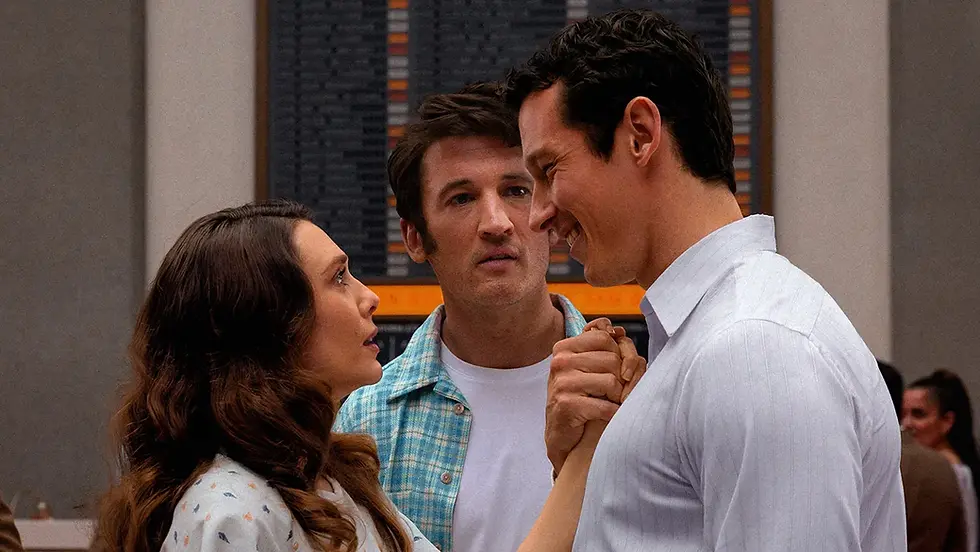Review: Decent political thriller 'The Mauritanian' stumbles in approach
- Nate Adams

- Feb 8, 2021
- 4 min read

Courtesy of STX Films
Kevin Macdonald’s well intentioned though occasionally flat post 9/11 legal thriller “The Mauritanian” has plenty of tricks up its sleeves. The biggest is French actor Tahar Rahim playing the film's gripping central character: Mohamedou Ould Slahi and whose side you’re not sure whether to be on. The film is framed to present his innocence as it’s based on his own best selling memoir “Guantanamo Diary.” Macdonald - perhaps best known for “The Last King of Scotland'' - has a wealth of material at his disposal, except Michael Bronner and Rory Hines screenplay does the bare minimum in finding the best angle for Slahi’s story. Opting for the easy crowd-pleasing sell, “The Mauritanian” is elevated by decent performances - not including Benedict Cumberbatch’s abysmal Louisiana accent - but fails to capture the bigger picture.
Not afraid to criticize George W. Bush’s administration's handling of potential 9/11 suspects, in which Defense Secretary Donald Rumsfeld authorized the use of torture maneuvers that clearly violated basic human rights, “The Mauritanian” shows how both sides of the political aisle failed to help when innocent folks were being detained because they fit a profile: Muslim. “The Mauritanian” brushes over how these tactics became customary, but Macdonald isn’t afraid to get his hands dirty with an almost fifteen minute sequence that basically serves as a highlight reel for the government's nastiest methods.
The film opens in November 2001, two months after 9/11, where Mohamedou has just returned to his native village after studying in Germany for an electrical engineering degree. When the police arrive and bring him in for questioning, Mohamedou assures his family it’s a formality and he’ll be back soon. Most of the evidence used for detaining Slahi is more presumed than anything: one phone call and money wire to a beloved cousin who happened to be one of Al Qaeda's primary operatives. American authorities are quick to throw Slahi’s involvement with the jihadists as cause, but that was during an attempt to overthrow the communist run Najibullah government, another moment the screenplay struggles to convey.
After all this, there are still no formal charges brought against Slahi, yet a damning testimony by some dude he doesn’t even know is enough for the U.S. to ship him off to Gitmo for what would be a grueling sentence. Cut to Nancy Hollander (Jodie Foster) one of the partners for a prestigious New Mexico law firm who decides to take on his habeas corpus appeal pro-bono. It’s the case that gets you publicity for all the wrong reasons, but when Hollander quickly alerts to the 700 prisoners the U.S government is housing with no formal trial dates, her colleagues agree. Hollander along with Terri Duncan - a young associate played by Shailene Woodley - head to Gitmo for their face-to-face with Slahi.
Meanwhile, Lt. Col. Stuart Couch (Cumberbatch) is getting pressured by his superiors to start taking out the trash and whose first case will be to try Slahi with the death penalty. For Couch, the case is personal after his good friend was killed on United 175. It’s that type of “thirst for justice” attitude that promotes this one dimensional character as someone with a flawed moral compass, but who will eventually see the error of his ways. Especially as he goes digging for evidence that he knows is mostly circumstantial (a source close to the vest played by Zachary Levi does the bare minimum for Couch’s efforts). It’s easy to root against characters with no backbone, but “The Mauritanian” doesn’t have that.
Cumberbatch and Foster are heavyweights and watching them spar over trial terms in a deserted airport doesn’t turn into the acting grand-slam you’d anticipate. In fact, Rahim is the only actor who brings depth to his character, showing more damaged emotion in his eyes with five minutes than what Cumberbatch’s lousy accent does in two hours. Woodly is a remarkable actress whose screen presence I admire, but she’s given a secondary character whose only job is to be the mediator and act distraught when facts come into focus.
A majority of “The Mauritanian” hinges on interrogation flashbacks and Slahi’s admirable, though ill-fated, attempt to maintain his innocence. Eventually, after days, months of reletneless torture, he confesses, but we all know that wouldn’t actually stand in a court of law. For anyone that’s seen news coverage or found themselves in a YouTube hole on Gitmo’s foundation, these scenes won't be shocking. They confirm what you already knew.
This doesn’t make the message or impact of “The Mauritanian” any less important and when the end credits shows footage of the real Slahi returning home to his family, it puts into perspective what Macdonald and others have advocated for: justice in a flawed system that doesn’t understand the difference between good and evil.
Grade: B-
THE MAURITANIAN will debut in theaters Friday, February 12th followed by a PVOD release later in the month.
COVID-19: Here at TheOnlyCritic.com, we’re committed to covering theatrical releases, but there’s still inherent risks in regards to going inside movie theaters. Please make sure you look up your local theaters COVID-19 guidelines and procedures before purchasing a ticket, and if you don’t feel comfortable going into a theater, please don’t. A positive review of an exclusive theatrical release is not an endorsement to put your health and safety at risk. In most cases, critics receive digital screeners or are invited to socially distanced press screenings, which defers heavily from what you might experience.





Comments